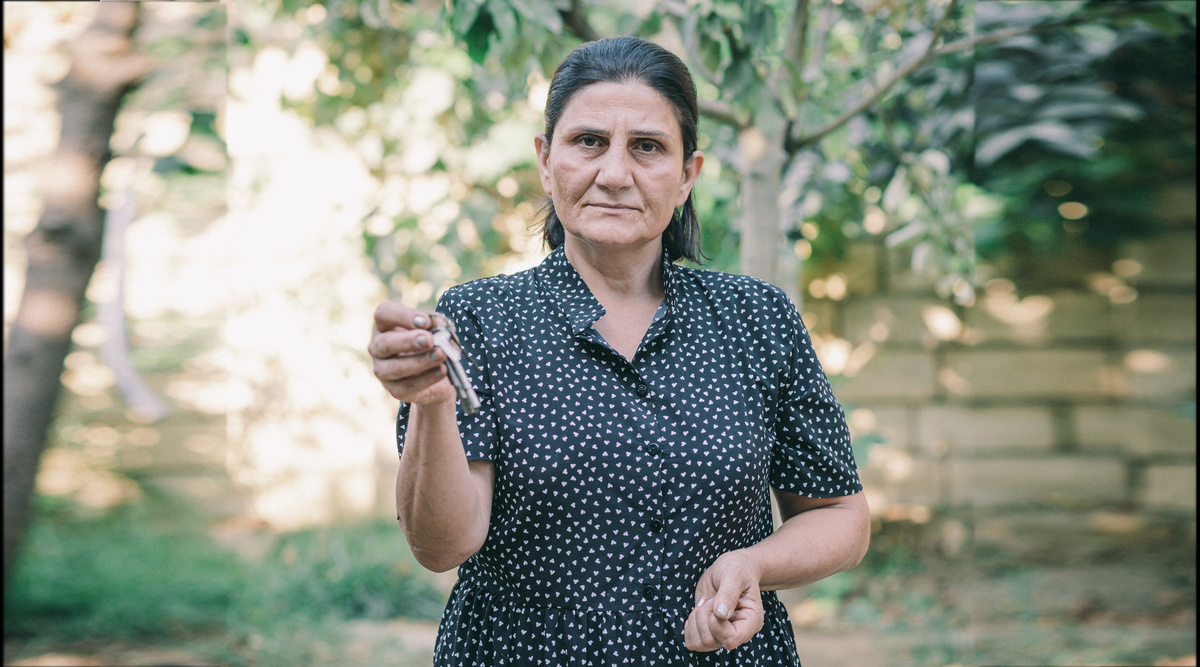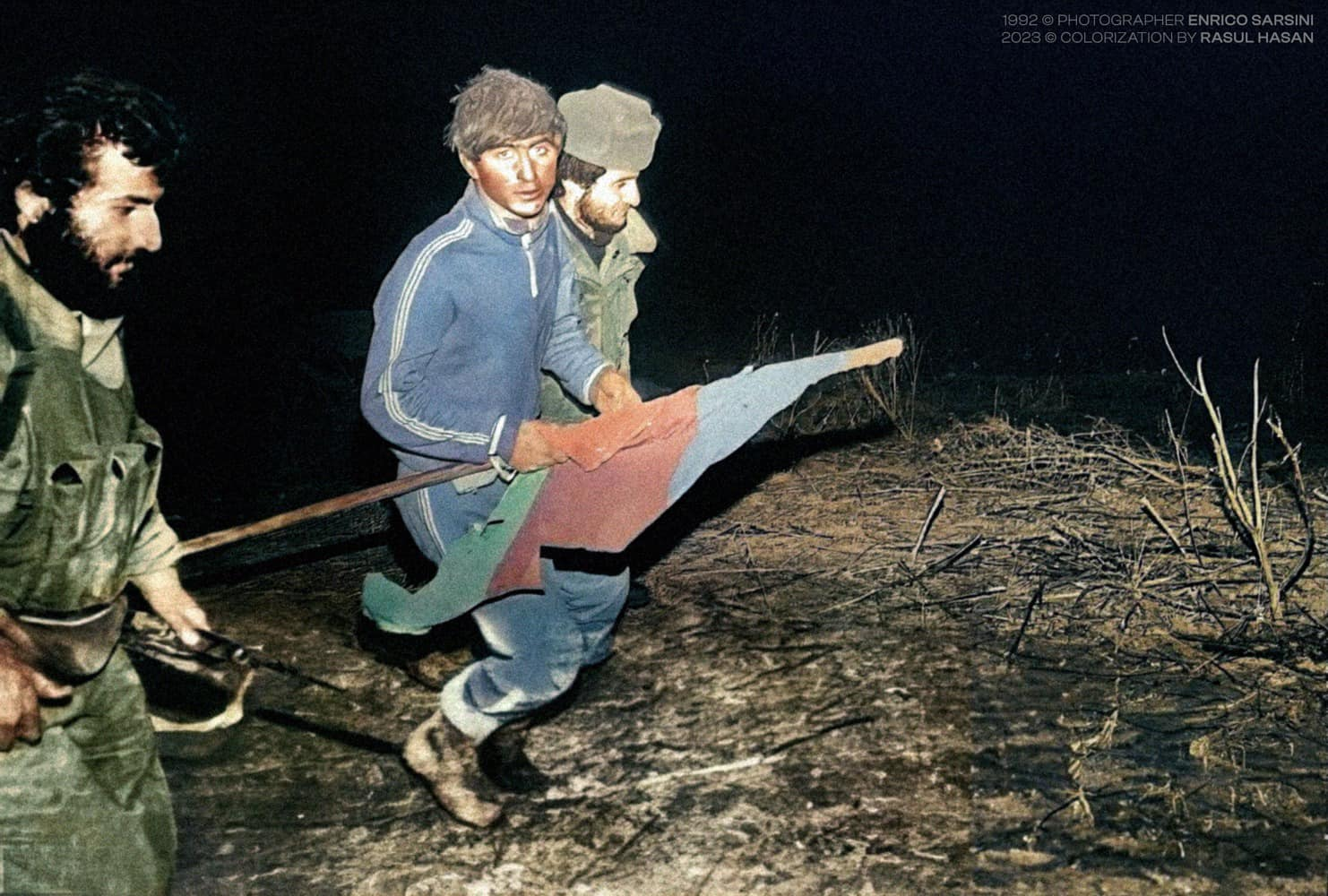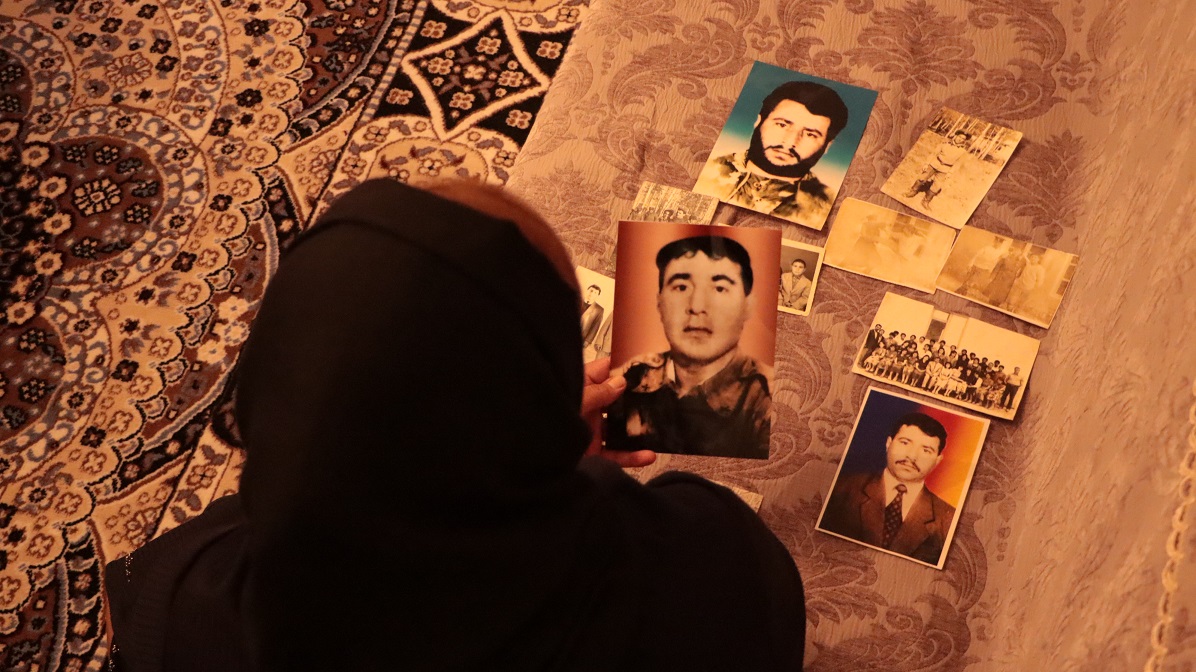"I miss our home". The story of 70-year-old Vidadi Mammadov, who is waiting to return to Khojaly
Return to Karabakh
We met him at a place called “Kvadrat” in the Khatai district of Baku. Walking ahead through the winding streets, he shows us the way.
“You can get lost here. But we’re almost there. We’ll reach the end of this building, and that’s it.“ He shows us an old building.
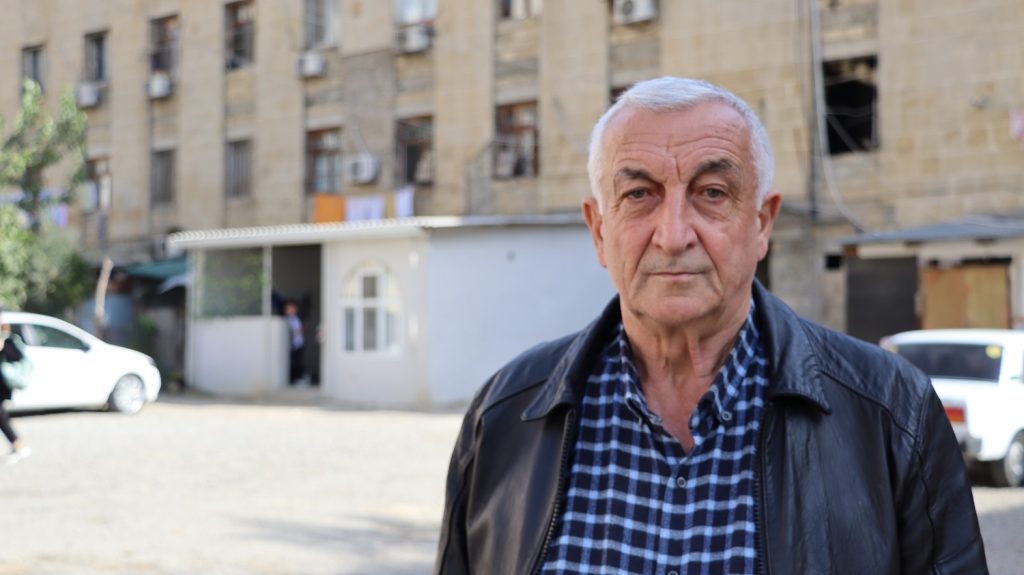
Vidadi Mammadov was born in 1954 in Khojaly. He now lives with his son, daughter-in-law and grandchildren in a small room in an annex adjoining an old building in Khatai district.
He shows a mulberry tree in his yard and says:
“There were many mulberry trees growing in the yard at our house in Khojaly. I have created a little Khojaly for myself here,” he says and smiles.
- “Georgians and Abkhazians work well together when they both need it” – Inguri HPP director, VIDEO
- Restoring relations after 10 years: Hungarian Foreign Minister’s visit to Yerevan
- Azerbaijani activists claim violence at the hands of law enforcement
On September 19, 2023, as a result of the Azerbaijani army’s counter-terrorist operation, the town of Khojaly returned to Azerbaijani control. Vidadi Mammadov says he cried with joy when he heard the news on television. Since that day, he has lived with the hope that he would soon return to his hometown:
“I miss our home. The roads I used to walk to school, our garden and vegetable garden are always in front of my eyes. We lived there not like in Baku, we had it very good, we lived in prosperity. We grew everything we needed – vegetables, fruits. We kept cattle, milk and meat also came from our own farm. When I go back there, I will restore this farm.”
“What I miss most is Gasym Spring at the foot of Gyrhgyz Mountain”
Vidadi will soon be 70 years old. His memory is weak. Sometimes he forgets addresses and phone numbers. But his memories of Khojaly are always very fresh.
He says that his father, Shukur Mammadov, was a beekeeper. He had many beehives in his yard. But Vidadi always avoided them, as he was afraid of bees.
When he was a teenager, he and his father would go to the Gasym spring at the foot of Gyrhgyz Mountain in the summer, pitch a tent there and stay for several days.
“I miss that spring most of all,” he says sadly.
The secondary school in Khojaly was an 8-year school. His brother Vagif had a higher education. His brother wanted him to get a higher education too and prepared him for university exams. Vidadi says that his dream was to become a construction engineer, but he could not get admission to the university. Instead, he became a driver, which at that time was considered a good source of income.
In 1974, he went to Baku for a while where he worked as a driver in bus park No. 1. Vidadi drove a bus for four years, running the route from Bina settlement to Narimanov district.
Return to Karabakh
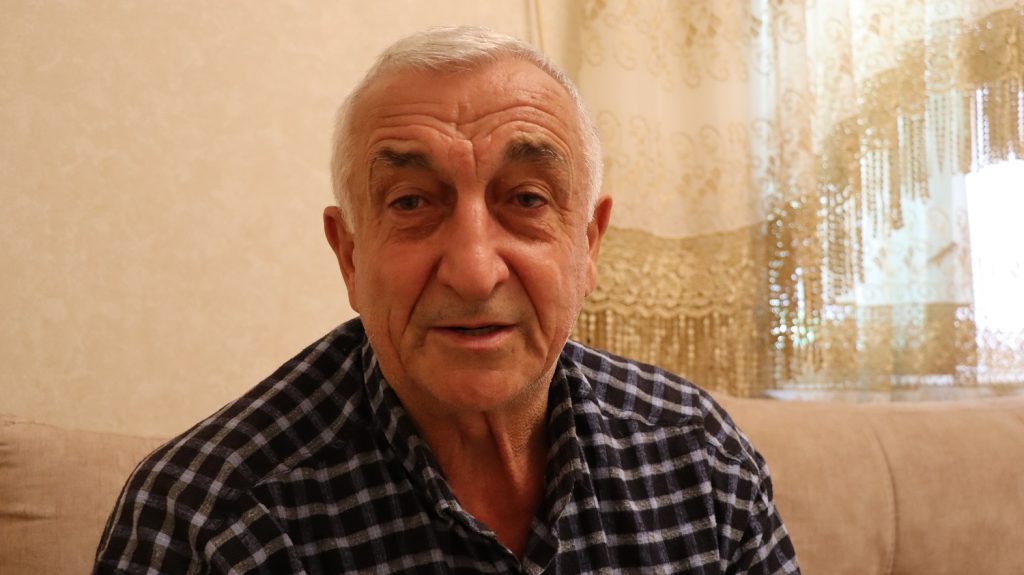
“The girl didn’t want to marry me, so I kidnapped her”
Vidadi could not stay in Baku any longer. His sister Ofelia called him back to Khojaly, as the family wanted to marry off their youngest son. Ofelia was working on a farm, she showed Vidadi a fellow worker. He liked the girl and decided to marry her. But the girl did not want to marry him, so Vidadi decided to kidnap her They ended up having a wedding in Khojaly.
“Friends and acquaintances from all over Khojaly gathered for the wedding. We also invited famous musicians of the time to the wedding. The wedding started early in the morning and lasted until night. I don’t know whether the former customs have been preserved in the regions. But at that time, weddings lasted at least one full day. The bride rarely attended her own wedding, and if she did, she did not dance.”
Two sons were born to Vidadi from this marriage. He says that after their marriage they lived there until Khojaly was occupied.
According to Vidadi, sometimes, when a driver was needed in nearby regions, he would go. But mostly they earned their living by farming. Vidadi says that the land in Khojaly was very suitable for cultivation, so they bought almost nothing on the market; most of the fruits and vegetables they grew themselves.
Return to Karabakh
“Until the last moment, I did not believe that Armenians would enter Khojaly”
“I slept in an Armenian house, we ate and drank together,” he says with nostalgia.
Before the first Karabakh war, he had many Armenian friends and acquaintances in Khojaly.
“We were friends, by God. My father had a lot of Armenian friends. They used to go to our place all the time. And an Armenian named Andrew was one of my father’s closest friends, he lived in Askeran. If I go back there now, I can show you the doors of each of them. I remember everything like it was yesterday. I don’t know how to explain it. They say they can’t be brothers to us, but we lived as brothers. How the relationship got to that level, I personally never understood. Honestly, we didn’t expect it,” he says.
Until the last, he did not believe that Armenians would attack Khojaly. Although the Armenian armed forces had already surrounded Khojaly with military equipment for several days. He still did not think that they would touch the civilian population — until the night of February 26, when tragedy struck.
Return to Karabakh
“In the evening they warned people to leave their homes, the Armenians would enter Khojaly. I didn’t believe until the last moment. I said, this can’t be.”
“People were being shot at, they were falling next to each other, there was no way to even check if they were alive or dead”
He was having dinner with his relatives when shots began to ring out in Khojaly at night. When he went outside, he saw a crowd running towards the forest. He also saw from afar tanks driving through the houses.
“We also ran away with everyone. People were being shot at, they were falling nearby, there was not even a chance to check if they were alive or dead. I was just glad that my wife and sons were in Barda that night,” he says quickly, as if trying to end this part of the conversation quickly and remember that night less.
Vidadi says that at that moment his only desire was to cross the Gargar River (which runs through the towns of Shusha, Khojaly, Aghdam and Aghjabedi), get away from the sounds of gunfire and get to Aghdam as soon as possible.
He walked for a long time. He thought he would freeze to death. That winter in Khojaly was very harsh, there was snow everywhere.
“They say eight families have been completely wiped out, one of them is my brother’s family.”
On February 26, before dawn, Vidadi’s uncle reached the Aghdam mosque. But not all of his relatives were able to walk this way together with him. He lost 16 relatives that night.
“When they talk about Khojaly on TV, they say that 8 families were completely destroyed. Here one of them was the family of my older brother Vagif Mammadov. He went missing together with his sons Azer, Jeyhun, Niyameddin and his wife Afila. No one saw them that night, they disappeared as a family. We also lost my younger brother Oktay. My uncle Yagub, my nephew Nijat, my father-in-law, my niece’s husband, three cousins, my brother-in-law, his niece… We lost 16 relatives that night,” he said.
Khojaly tragedy in statistics
According to the Azerbaijani government, 613 inhabitants of Khojaly, including 63 children, 106 women and 70 elderli, were killed i the Khojaly massacre that took place on the night of February 25-26, 1992.
Twenty-five children lost both parents, 130 children lost one of their parents.
487 people were wounded, including 76 children. 1275 people were taken hostage. The fate of 150 of them, including 68 women and 26 children, is still unknown.
Only 200 bodies were brought from Khojaly to Aghdam, and it turned out that dozens of them had been desecrated. In Aghdam, 181 corpses were subjected to forensic medical examination. It was established that 151 people died from bullet wounds, 20 people – from shrapnel wounds, 10 people – from blunt object blows.
Azerbaijan and a number of foreign countries recognized the Khojaly tragedy as genocide.
Return to Karabakh
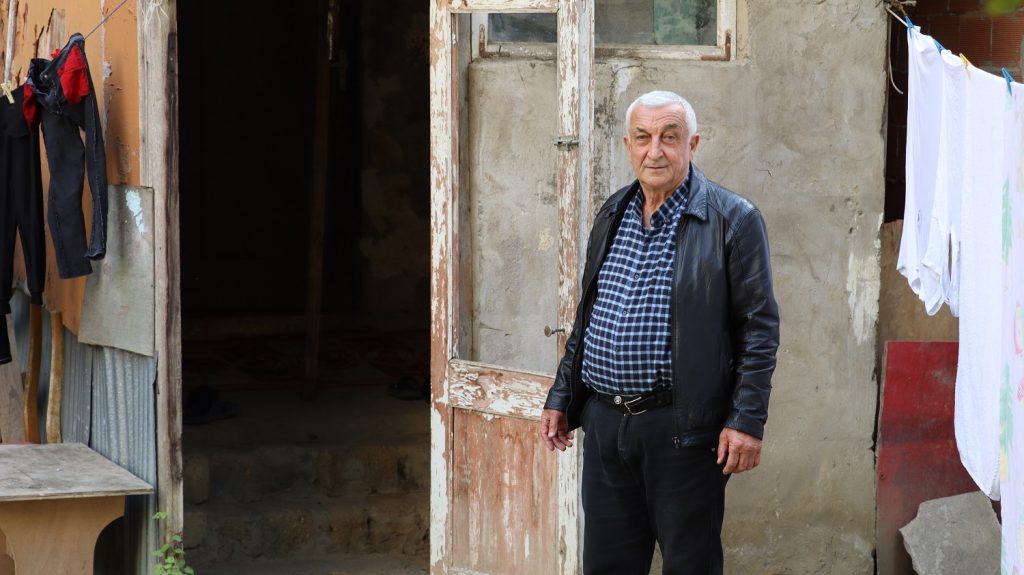
Forced displacement and return
During the first Karabakh war, more than 500,000 Azerbaijanis were forcibly expelled from the occupied former Nagorno-Karabakh Autonomous Oblast and seven adjacent districts (Aghdam, Fizuli, Jabrayil, Zangilan, Gubadli, Lachin, Kelbajar). They settled in different cities and districts of Azerbaijan, including Baku.
In the first 10 years they were settled mainly in tent cities, wagons and dormitories, and later they started to build towns. From 2003 to 2007, 12 tent cities in Bilasuvar, Barda, Agjabeda, Sabirabad, Saatli districts were liquidated.
At the next stage, all families living in wagons were relocated to new apartments, and families living in dormitories began to move out.
About one hundred settlements have been built in different cities and districts of Azerbaijan to improve the housing conditions until 2020.
After the territories returned under the control of Azerbaijan after the second Karabakh war, the construction of new settlements started in Zangilan, Jabrail, Fizuli, Agdam and other districts where settlements were destroyed during the years of Armenian occupation. The process returning them to their native regions and villages has already started.
According to the information of the State Committee for Refugees and IDPs, about 2,000 families, i.e. almost 10,000 people, are planned to be returned and permanently resettled in Karabakh and East Zangezur economic regions by the end of 2023.
Return to Karabakh
“There is no guarantee that they will not make territorial claims again.”
After losing his home in Khojaly, Vidadi moved with his family members to Baku. He no longer had a job where he could earn a living, nor a house where he could live with his family.
When he left Khojaly, he had no opportunity to take anything from home — except for his photograph in his wallet, which he brought with him in his pocket.
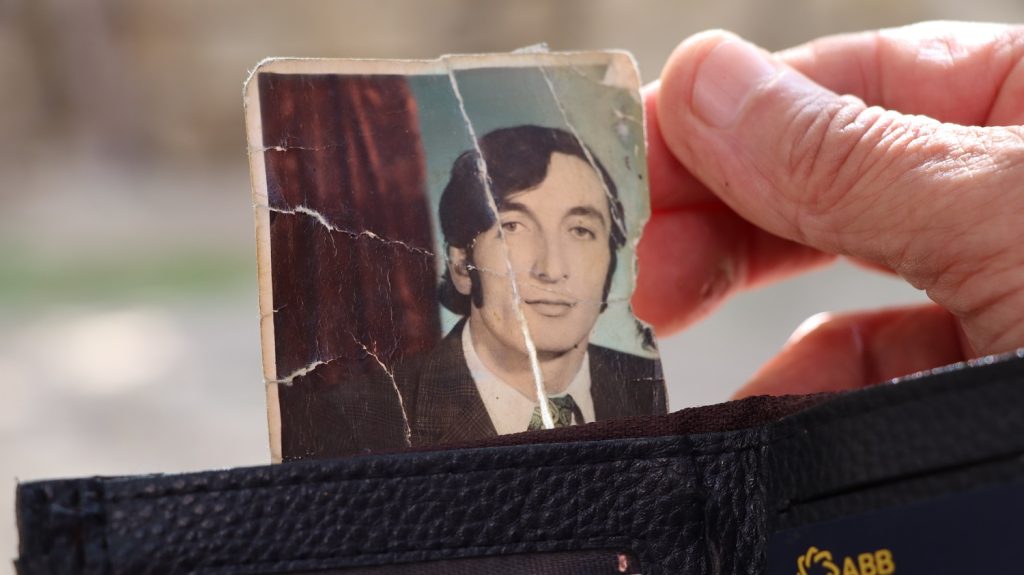
He says that for the first three days after his arrival in Baku, he and his wife and sons had to spend the night on the street near Aina Sultanova park. People from the neighborhood brought them blankets and coats to keep them warm.
At the prompting of the same, Vidadi went to one of the hostels located in Zykh settlement. There he found the administrator, explained the situation, and said that they had nowhere to live. The man helped them find a room in the hostel:
“The administrator told me that a guy lives in one of the rooms on the upper floors, come on, I’ll put you there. He is single, all alone, he will find you a place to live.”
The Mammedov family settled in the room and lived there until 2006, when they moved to this room located in Khatai district, where we talked to him.
Return to Karabakh
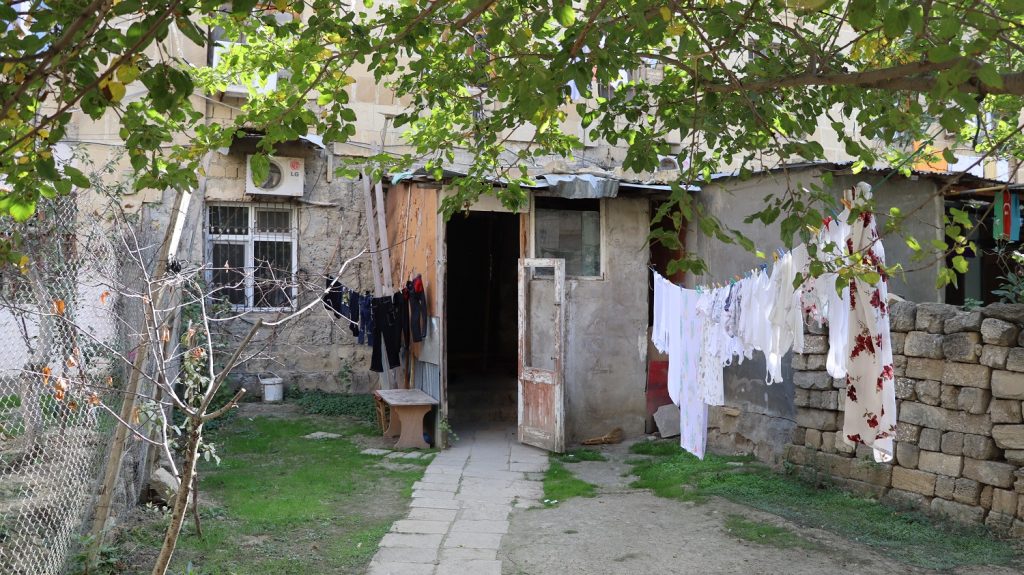
Now his only wish is to return to Khojaly, where he was born and grew up. But coexisting with Armenians there is out of the question
“I don’t know if you can call it fear or distrust. If we start living together with Armenians again, I am not sure that they will not once again make territorial claims in Karabakh. Who can guarantee otherwise? So it is better that only Azerbaijanis live in Karabakh”.
Return to Karabakh










